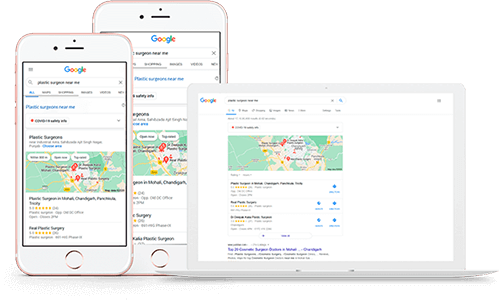 If you’ve landed on this blog post, you likely are curious what are the top 7 reasons why plastic surgeon SEO doesn’t work. As I am writing this blog post, I am hoping that your curiosity was piqued as opposed to you trying to figure out why your plastic surgery SEO campaign isn’t working.
If you’ve landed on this blog post, you likely are curious what are the top 7 reasons why plastic surgeon SEO doesn’t work. As I am writing this blog post, I am hoping that your curiosity was piqued as opposed to you trying to figure out why your plastic surgery SEO campaign isn’t working.
It is unfortunate when that happens as we’ve heard our clients tell us that in some instances, they spend $3,000.00 a month just on SEO. That is quite a bit of coin to not get any results!
The goal of this blog post is to share the top 7 reasons we’ve seen plastic surgeon SEO not work.
Table of Contents:
Reason #1 – Lack of Content / Duplicate Content
Reason #2 – Lack of Backlinks
Reason #3 – Wrong Types of Backlinks
Reason #4 – Spammy Anchor Text Ratio
Reason #5 – Slow Loading Website
Reason #6 – Over-Optimized Website
Reason #7 – “One-Time” SEO
The Top 7 Reasons Plastic Surgeon SEO Doesn’t Work
Reason #1 – Lack of Content / Duplicate Content
If it were only as simple as having a beautiful website, SEO would actually be pretty tough. It’d then be subjective to who is grading the website. One of the most common issues we see with plastic surgery websites is that they are inherently photo heavy. Of course, you want to show off what you do best. Transformations. Before and After. That is the sizzle on the steak. The less sexy part is actually writing thorough, in-depth content. This is what Google loves. It provides an extreme amount of value to your visitors. Differentiate yourself by being the authority who breaks down each aspect of the procedure you specialize in.
If you’ve found something from a generic source and copied that, you won’t be seeing any benefit from that. It is known as duplicate content and something Google doesn’t enjoy seeing. Take the time to write original content.
What You Can Do About It: Go into each procedure specific page that you have and write in-depth content. See the post Plastic Surgeon SEO – Optimizing and Perfecting Your Content (if you have them) if not, head over to our post – Plastic Surgeon SEO – Starting with the Basics to understand why it is important to have them.
Reason #2 – Lack of Backlinks
Head over to Google Search Console and pull up your Links Report. Backlinks play a major role in how your website ranks when compared to your competition. If two websites have equal volumes of content, equal quality, backlinks are the main deciding factor with regards to who will reign supreme. Fortunately, there are tools like Ahrefs.com & SEMRush.com that allow you to scope out some of your competitors backlinks!
Being armed with this intel can inform you where you fall on the spectrum of backlinks. Just keep in mind, not all backlinks are created equal. Quality, relevance, type, and anchor text all play a role in how powerful a backlink is. Our performance-based plastic surgeon SEO offering handles acquiring the right type of backlinks. This is a core offering of SEO and without out, plastic surgeon SEO doesn’t work.
What You Can Do About It: Attempt to get featured in industry publications like the American Society of Plastic Surgeons or research papers and have a link that goes back to your website within the content. This is known as a contextual link and is very powerful. If you have friends that are also surgeons, ask them if you can write a guest blog post about your area of expertise and include a link back to your website. Be sure to follow the best blogging practices!
Reason #3 – Wrong Types of Backlinks
Maybe you fell victim to an offer that sounded too good to be true. With freelancers bombarding inboxes from all over the world, it is hard to ignore those emails telling you that for $100.00 you can get 1,000 backlinks. Seems like a cheap way to solve the lack of backlink issue as described above.
However, there are automated backlinks created by software which are very low in quality. You wouldn’t want to utilize these services as Google identifies them as spam. These links are often automated blog comments that have thousands of other comments, spam on private blog networks, and other low-quality backlinks.
What You Can Do About it: Avoid these types of links like the plague. If you happened to have purchased them or a company that you hired built these types of links, you can utilize a powerful feature within Google Search Console known as the Disavow Tool. Caution: Disavowing the wrong types of links can have a negative impact on your website. Disavow with caution.
Reason #4 – Spammy Anchor Text Ratio / Black Hat SEO
A spammy anchor text ratio is a big no-no. Anchor text is what you define as the blue clickable link when you write an article. It is the words that describe the link. Way back in the day, people used to just jam hundreds of their keywords inside of anchor text to rank well.
Some companies still utilize this practice despite the fact that it can actually penalize your website. The infamous algorithm update known as Google Penguin released initially in 2012 destroyed many websites that utilized this archaic link building method. A plastic surgeon marketing agency like ours will never create these kind of spammy links.
What You Can Do About It: Ensure that when you are building links, you aren’t exclusively using the keyword you want to rank for as your anchor text. Utilize your brand name, your domain name, your company name, etc. Of course, when you write fantastic quality content naturally other websites will link to your website and typically will never use whatever keyword you are attempting to rank for. If you have spammy anchor text links and your keyword accounts for more than 10% of your backlink profile, you can Disavow those links within Google Search Console.
Reason #5 – Slow Loading Website
Giving your plastic surgery patients a fantastic experience is important, right? Well the same applies with Google and major search engines giving their customers (your patients) the best experience. Do you think your patients want to visit a website that takes 12+ seconds to load? Of course not! Google also wouldn’t send their visitors to your website either as it would reflect bad on them. The faster that you can make your website the better user experience you will provide your patients.
What You Can Do About It: You can head over to Google Page Speed Insights and run a test to see where your website ranks. It will give you a score from 0 – 100. Even better, it will give you tips and tricks to increase your website speed. This is a Google tool and site speed is a confirmed ranking factor. Don’t expect this to be the “smoking gun”, but it is one thing that Google cares enough about that they built a tool around it, that should say enough about its importance.
Reason #6 – Over-Optimized Website
The opposite of a website without ample content is a website that is over-optimized. This is another reason why plastic surgeon SEO doesn’t work. If you have multiple pages about the same exact topic just worded differently, this isn’t good and is considered over optimization. The same applies if you have a page that has a 20% keyword density which means that if your page has 100 words and your keyword is plastic surgeon in Miami, then plastic surgeon in Miami will be in your content 20 times. As you can see, that isn’t naturally and quite spammy in nature.
What You Can Do About It: De-optimize your content. Read it aloud and see if it sounds spammy. Would you read that page in front of a patient? That is a good indicator if you’ve stuffed keywords and the page is over optimized. If so, re-write the content and make it sound more natural. Provide value about your service without worry about how many times you use your keyword. If you have multiple pages on the same topic, condense all the pages into one cornerstone piece of content and do 301 redirects to the old pages that you will no longer kep live.
Reason #7 – “One-Time” SEO
Our last reason is those that have done a “one-time SEO” kind of deal. Plastic surgeon SEO campaigns are on-going in nature and should never stop. You want to keep providing value to your patients and this is exactly what Google rewards. Come out with case studies, blog about new technologies, new procedures, new trends, patient FAQs, new packages you offer, specials, etc.
If you’ve done SEO one-time and not seeing results, it isn’t that SEO doesn’t work, it is that it is an on-going endeavor. If you take a look at our blog, you’ll notice that it is updated at minimum once a month. If you happen to see a month where there is no blog, it is because there is a blog on another 3rd party website! We’re always sharing in-depth information to help provide plastic surgeons with an insane amount of value for free.
What You Can Do About It: Consider an on-going SEO campaign whether done internally or by hiring a plastic surgeon marketing company like Advertising for Surgeons.
The Takeaway:
There are various reasons why plastic surgeon SEO campaigns fail. We hope that you were able to identify why your SEO campaign isn’t working if that was the goal of reading our post. If you’d like expert assistance while paying $0.00 in monthly retainers, we might be a good fit.
Our local plastic surgeon SEO campaigns are performance-based meaning we don’t get paid unless we’re successful. This eliminates the chances of you getting into the frame of mind that plastic surgeon SEO doesn’t work. That is how confident we are in our white-hat Plastic Surgeon SEO service and you won’t have to worry about paying thousands each month for something that may or may not work.






